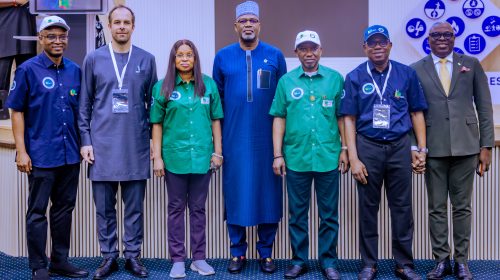Nigeria to anticipates $40bn oil investments by 2023 – Kachikwu

The Minister of State for Petroleum Resources, Ibe Kachikwu, has disclosed that Nigeria would be anticipating to rake in about $40bn worth of oil investments come 2023.
Kachikwu who made forecast at the inaugural Nigerian International Petroleum Summit (NIPS), explained that current realities in the international oil market indicated that unless the country began to move away from just exploring and mining crude oil to processing it completely, it may be difficult for her to leverage the commodity to develop her economy.
According to him, the country’s refineries were currently producing at 14 per cent capacity, oil firms operating in the nation would not be allowed to ship out all the crude they produce without refining some locally in the near future, he insisted.
He noted that on this basis, the country would be looking to grow her local grip on the industry from the current 10 per cent to 50 per cent in 10 years, adding that a Floating Production Storage and Offloading (FPSO) oil platform would be wholly built in the country amongst other in-country based innovations in the sector.
Declaring event open, President Muhammadu Buhari stated that Nigeria was now ready to have more investors come in to develop her downstream petroleum.
Buhari who was represented by the Secretary to the Government of the Federation (SGF), Mr. Boss Mustapha,
also stated that his administration was determined to clean up the country’s oil sector from the alleged age-long corruption, noting that he would not stop until he was sure transparent business practices were back to the sector.
Speaking further, Kachikwu stated, “The reality is that today, if you cannot produce cheap cost oil, if you cannot diversify the processing of your oil, if you cannot look to internalising and externalising investment in the sector, if you cannot capture the requisite technical skills that are essential to help you operate efficiently, you are lost before you start.”
“The challenges for oil companies have changed. Oil has got to provide the resources to power this country, jobs for our people and the operational environment that is transparent enough for others to take Nigeria seriously. Oil has got to provide the technical and advanced skills sets that are essential for us to export people out to other African countries, and to become investors in other African countries.
“Something the banking sector has tried to do successfully over the last six to seven years.
My target is that over the next 10 years, Nigeria would produce an FPSO, and that is not too much to ask. My target over the next 10 years, Nigeria would become self-sufficient in its own power provision. And over the same period, from crude oil, Nigeria would gravitate, as it were, to very refined, clean provision of fossils.
“My target is that over that same period, investment in the sector, in the sense that Nigerian companies, Nigerian entities and Nigerian shareholders, would begin to move from the minuscule 10 per cent today, to between 40 and 50 per cent of local investments.”
He said there are major plans to achieve these objectives using the ‘Seven Big Win’ oil policy of the government, and that the oil sector has not lacked the opportunities to make these happen.
“What have we achieved since the launch of the 7Big wins two years ago? We have been able to, through a lot of struggle, changed the funding capacity for the upstream, and that had sort of energised investors in the upstream sector. Now we are beginning to see projects like Egina, $15 billion, Zabazaba – potential $10 billion, Bonga -potential $10 billion and the likes.
“So many other investments put at over $40 billion potential investments over the next five years. If we do the right thing, set the right models and set the right policies, that is very key and that is coming from a country where investments had runaway for nearly seven to 10 years,” he added.
The minister also said multinational oil companies operating in Nigeria might be compelled by the federal government to build refinery facilities in Nigeria to ensure the country fully maximises its hydrocarbon resources and move away from just exporting crude oil.
Speaking at an executive session titled: ‘Deepening Collaboration in the African oil and Gas Industry – Challenges and Opportunities for Investment,’ Kachikwu stated that the government was considering a new move that would have the multinational oil and gas firms build refineries in Nigeria.
He said in the not-too-distant future, multinational oil firms would no longer be allowed to ship out all the crude oil they produce in Nigeria, adding that emphasis would then shift to local processing of a substantial amount of crude oil that is produced from oil fields in Nigeria.
The minister explained that Nigeria’s average in-country refining capacity was 14 per cent and would need to be upgraded to meet the demands of her rising population.
The session had in attendance the United States Ambassador to Nigeria, Mr. Stuart Symington, Minister of Petroleum of Chad, Mr. Bechir Madet, as well as the Secretary-General of the International Energy Forum (IEF), Dr. Sun Xiansheng, amongst others.
He stated: “We would get to a point where Nigeria, definitely, would be a major supplier of refined petroleum products. It just has to happen. Nothing else makes sense. We are also saying directly to oil companies that a time would also come when we would not be open to see them move around all the crude oil they produce in Nigeria.
“We will like to see integrated refining and integrated processing here. It gives us more jobs and creates more investments.”
The minister explained that the challenges for oil companies have changed, noting that henceforth, oil has got to provide the resources to power the country, provide jobs for Nigerians and also provide the operational environment that is transparent enough for others to take Nigeria seriously.
According to him, oil has got to provide the technical and advanced skills-sets that are essential for the country to export people out into other African countries, and to become investors in other African countries.
Buhari, in his opening remarks also buttressed Kachikwu’s statements, and explained that the NIPS was part of his government’s efforts to use the country’s oil industry to relaunch her economy through the Economic Recovery and Growth Plan (ERGP).
He said: “The summit is designed to be Africa’s largest and most important platform and linkage to the world where technological breakthroughs will be unveiled. This summit will afford Nigeria a unique opportunity to showcase to the international community policy direction and efforts of government in the petroleum sector especially the new oil and gas exploration and markets, new measures to sanitise the sector, the expansion of investment opportunities to boost investors’ confidence, technological advancement, Nigerian content development, the institutionalisation of reforms in the country’s oil and gas industry and the galvanisation of Nigeria’s position as the leading oil producer in the continent of Africa.”
The president explained that: “Nigeria is open to private sector investment in the downstream sector and pursuing vigorously a programme for the rehabilitation of existing refineries so as to enhance capacity to supply locally refined petroleum products in Nigeria and West Africa. This is a very key component of the national petroleum industry roadmap and the 2017 to 2020 Economic Recovery and Growth Plan (ERGP).”
Speaking on his plans to sanitise the sector, and make it transparent, Buhari said: “Corruption in this industry must not be allowed in any form. On our part, we will not stop the fight until a new image is created where transparency will be the watchword in all our transactions.”
The Secretary-General of the Organisation of Petroleum Exporting Countries (OPEC), Dr. Mohammed Barkindo, in his remarks at the NIPS, stated that countries’ compliance levels to the production cap agreement the cartel and non-OPEC members reached in 2017 and later rolled over to rebalance the oil market recorded a collective 133 per cent in the first month of 2018 – January.
Barkindo, who called for conducive operational conditions for member countries to continue to stabilise the market, explained that the cooperation between OPEC and non-OPEC members had become a force to reckon with in the global oil market. He also lauded Nigeria’s contributions to the success of the cooperation.
He said: “OPEC has embarked on one of the most innovative enterprises ever known in the history of oil – the declaration of cooperation. This innovation was a response to an unprecedented market turbulence which had a devastating effect not only in the industry but in the economies of OPEC member countries.
“Price cycles are not new in the history of oil, OPEC has identified six since the early 1970s, however, this price cycle should be considered unique for several reasons: it is the most overwhelming supply-driven of all the cycles we have seen in this exercise. Secondly, the magnitude of the price drop is the highest, thirdly, the recent oil price drop has been considerably sharper with the decline in prices for other commodities which is in sharp contrast to the oil price collapse of 1985/1986 when all commodity prices declined in a similarly steep manner.“
“Thankfully, a breakthrough came in the form of the declaration of cooperation. This was the culmination of an extensive consultation undertaken throughout 2016 with the aim of gaining consensus about the strategic urgency of bringing this market back to balance in a collective manner.
“If one word was to be used to describe the impact of the declaration, it would be ‘transformative’, a new player has emerged on the global oil scene – the OPEC and non-OPEC strategic partnership. Many didn’t think it would get off the ground, however, we have registered conformity in 2017 of 107 per cent across all the participating countries and I would like to use this platform to also announce our January figures of 133 per cent that would be released in a couple of hours in the OPEC secretariat,” added Barkindo.







Leave a Reply